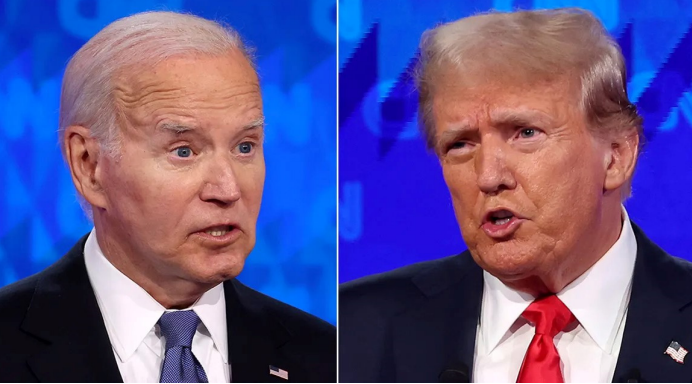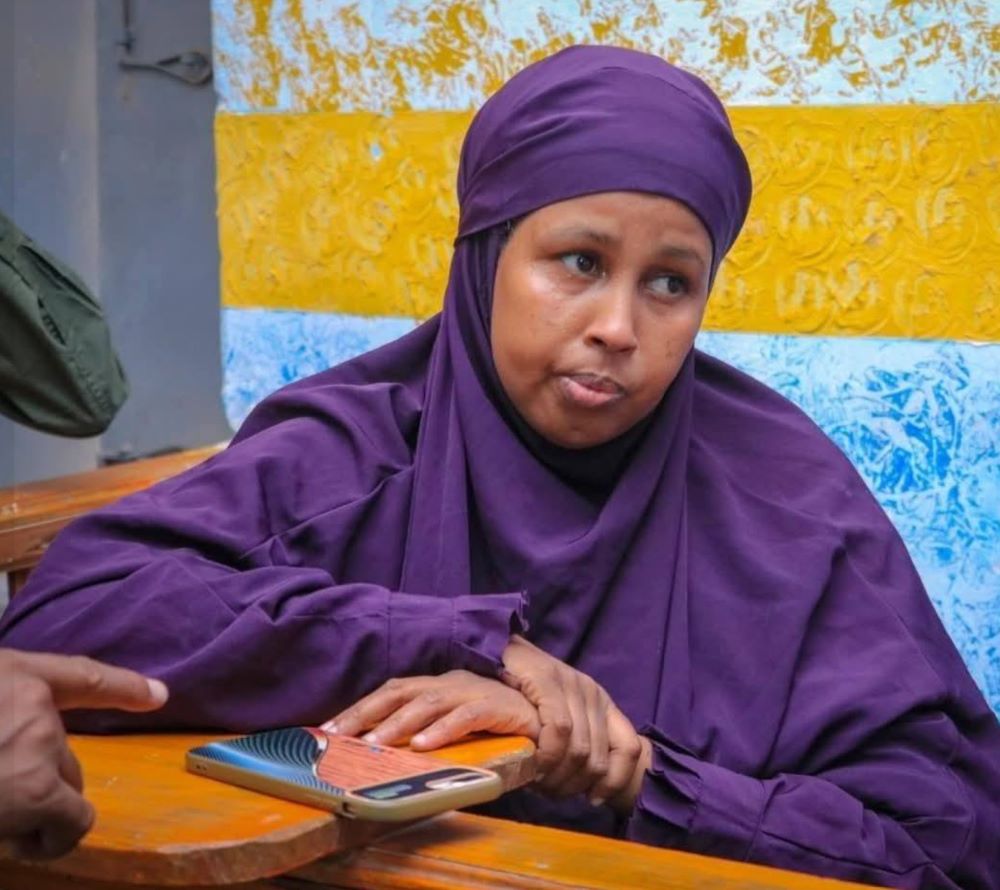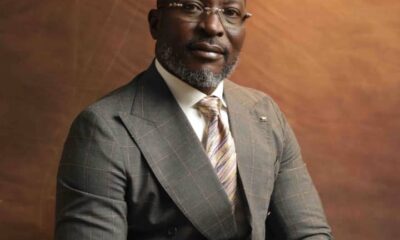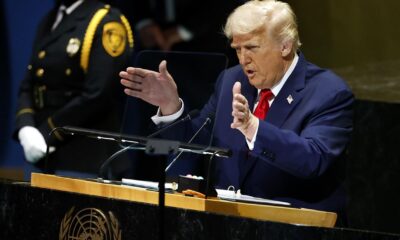News
Kamala Harris: On The Cusp Of History, Ready To Shatter America’s Last Glass Ceiling

For years Kamala Harris faced criticism that she was not up to the job of being a heartbeat away from the presidency. Now, she finds herself feted by Democrats as their best hope to stop Donald Trump’s comeback.
Despite blazing a trail as the first woman, Black and South Asian vice president in US history, the 59-year-old Democrat long struggled with approval ratings as bad or worse than President Joe Biden’s. The last 12 months, however, have revealed a transformed Harris.
And with Biden’s endorsement of Harris after stunning the world by dropping his own reelection bid Sunday, she’s suddenly on the cusp of history.
As the ageing Biden faded over the last year, his “veep” emerged as a force on the campaign trail, pushing for abortion rights and reaching out to core voters, including suburban women and Black men.
Harris will hope she has done the hard work to earn her full party’s backing in the midst of the crisis.
With a fondness for the f-bomb and her family nickname of “Momala” going viral, she has also finally started to cut through the noise to voters who previously barely paid attention.
She has also won plaudits in party circles by staying loyal to the 81-year-old president during the last few weeks, even as political vultures circled over his candidacy.
She now is likely to face Trump — a brutal battle against a candidate who defeated Hillary Clinton in her bid to become the first female commander-in-chief in 2016.
The fact that Harris has blamed much of the criticism of her by Republicans on racism and sexism would likely make a win feel even more vindicating for her.
Trump and other Republicans have notably stepped up their attacks on her as Biden’s position weakened and polls showed Harris would fare better against him than Biden.
A child of immigrant parents — her father was from Jamaica and her mother from India — Harris grew up in Oakland, California, in an activist household that saw her attend her first rallies in a stroller.
Her focus on rights and justice saw her build an impressive CV, becoming California’s first Black attorney general and the first woman of South Asian heritage elected to the US
Senate.
Harris then went up against Biden in the 2020 primaries. In one stinging attack, she criticized him for allegedly opposing the bussing of students to segregated schools.
“There was a little girl in California who was part of the second class to integrate her public schools, and she was bussed to school every day. And that little girl was me,” she said in a barbed attack on her future boss.
But as his running mate, she consolidated the coalition that helped defeat the incumbent Trump in 2020. Her transition to the White House, however, proved difficult.
Critics said she was underwhelming and gaffe prone in a job that has been known to flummox many officeholders.
Struggling to carve out a role, she was tasked by Biden with getting to the roots of the illegal migration problem, but fumbled and then got defensive in response to a question during a visit to the Mexican border. Unusually high staff turnover fed rumors of discontent in the vice presidential office.
And Republicans relentlessly targeted her as being unfit to take over should the worst happen to America’s oldest-ever president, often resorting to stereotypes her supporters branded as sexist and racist.
Harris told the Wall Street Journal in February: “I am ready to serve. There’s no question about that.” Things began to change as the 2024 race got underway.
The Biden campaign repeatedly deployed her to battleground states to hammer home the party’s message on abortion rights, with Harris becoming the first vice president to visit an abortion clinic. Gradually, she began to draw warm and fired-up crowds.
Some of the outreach was, however, cringe-inducing. Earlier this year, she was mocked after she told chat show host Drew Barrymore her family sometimes called her “Momala,” and
Barrymore replied: “We need you to be Momala of the country.”
But voters seemed to be switching on.
A clip of her quoting her mother as often saying “You think you just fell out of a coconut tree?” became a meme, with a rising sense among supporters that now could be her time.
If elected, Harris would break one of the highest glass ceilings left for women in the United States — that of occupying the country’s top office.
Her husband, Douglas Emhoff, would also be breaking new ground, moving from being the current Second Gentleman to the country’s first First Gentleman.
News
Puntland Executes Woman for Murder of 14-Year-Old Girl

Puntland Executes Woman for Murder of 14-Year-Old Girl
Authorities in Puntland, a semi-autonomous region of Somalia, have executed a woman convicted of murdering a 14-year-old girl, in a rare case in which the death penalty was carried out against a female offender.
The convict, Hodan Mohamud Diiriye, 34, was executed by firing squad on Tuesday in Galkayo, the capital of Mudug region, after a court found her guilty of beating a teenage girl to death.
The victim, identified as Saabirin Saylaan, had been working as a domestic helper in Diiriye’s household.
Her killing in November triggered widespread protests in Galkayo and renewed calls for stronger child protection measures in the region.
Officials said the execution was carried out under qisas, an Islamic legal principle that allows the family of a murder victim to demand capital punishment instead of accepting financial compensation.
Mudug State Governor, Faysal Sheikh Ali, confirmed that members of both the victim’s family and the convict’s family were present during the execution.
A regional decree mandates the enforcement of Islamic law in murder cases, according to Puntland authorities.
Officials also said the execution marked the first time in more than a decade that a woman had been put to death under a retaliatory sentence in Puntland.
The last known execution involving a woman occurred in 2013, when 13 members of the Islamist militant group, al-Shabab, including one woman, were executed for their role in the killing of a prominent Islamic cleric, authorities said.
Investigations revealed that Saabirin, who was orphaned at a very young age after losing both parents, had been living with Diiriye’s family for about two months before her death.
Police said the teenager had suffered repeated physical abuse during that period.
Digital evidence recovered during the investigation reportedly showed a pattern of sustained violence, some of which circulated publicly ahead of the trial.
A post-mortem examination found that the victim sustained multiple injuries consistent with prolonged abuse, authorities said.
As details of the case emerged, public outrage intensified, with hundreds of women and youths staging protests across Galkayo, demanding justice for the victim and accountability for those involved.
Community leaders, activists and civil society groups have since renewed calls for stronger legal protections for children and domestic workers, who they say remain particularly vulnerable to abuse in Somalia.
The case has drawn national attention to the often-hidden problem of child abuse, especially within domestic and extended family settings, where such cases frequently go unreported.
News
Muammar Gaddafi’s Son, Saif al-Islam, Reportedly Shot Dead in Libya

Muammar Gaddafi’s Son, Saif al-Islam, Reportedly Shot Dead in Libya
Saif al-Islam Gaddafi, son of Libya’s former leader, Col. Muammar Gaddafi, has reportedly been shot dead in circumstances that remain unclear, Libyan media sources said on Tuesday.
The death of the 53-year-old politician was confirmed by the head of his political team, according to the Libyan News Agency.
However, conflicting accounts have emerged over the circumstances surrounding his death.
His lawyer told the AFP news agency that Saif al-Islam was assassinated at his residence in the city of Zintan by a “four-man commando” unit.
The lawyer did not disclose who may have been responsible for the killing.
In a separate version of events, Saif al-Islam’s sister told Libyan television that he died near Libya’s border with Algeria.
Saif al-Islam Gaddafi was long regarded as the most powerful and feared figure in Libya after his father, who ruled the country from 1969 until he was ousted and killed during a popular uprising in 2011.
Born in 1972, Saif al-Islam played a prominent role in Libya’s rapprochement with Western nations from around 2000 until the collapse of the Gaddafi regime.
Despite holding no official government position, he wielded significant influence and led high-level negotiations on behalf of his father.
These efforts included talks that culminated in Libya abandoning its nuclear weapons programme, a move that led to the lifting of international sanctions and restored diplomatic ties with Western countries.
At the time, Saif al-Islam was widely portrayed as a reformist figure and the acceptable face of a changing Libya.
Following the fall of his father’s government, Saif al-Islam was accused of playing a key role in the violent repression of anti-government protests in 2011.
He was subsequently captured and detained by a militia in Zintan, where he spent nearly six years in custody.
The International Criminal Court sought his extradition to face charges of crimes against humanity related to the suppression of the uprising.
In 2015, a court in Tripoli sentenced him to death in absentia for his alleged role in the crackdown, although the ruling was rejected in eastern Libya.
He was released in 2017 by a militia in Tobruk under an amnesty law enacted by authorities in the east of the country.
Since the overthrow of Muammar Gaddafi, Libya has remained deeply divided, with rival governments and numerous armed groups controlling different parts of the country.
Although Saif al-Islam had repeatedly denied any ambition to succeed his father, insisting that power was “not a farm to inherit,” he re-emerged on the political scene in 2021 when he announced his intention to contest the presidency.
That election was later postponed indefinitely, prolonging Libya’s political uncertainty.
As of Tuesday, Libyan authorities had yet to issue an official statement clarifying the circumstances surrounding his reported death.
News
DA Leader Steenhuisen to Step Down, Raising Fresh Uncertainty Over S’africa Coalition

DA Leader Steenhuisen to Step Down, Raising Fresh Uncertainty Over S’africa Coalition
Leader of South Africa’s Democratic Alliance (DA), John Steenhuisen, has announced that he will not seek re-election when the party holds its leadership contest in April, a decision that could unsettle the country’s fragile coalition government.
The DA, South Africa’s second-largest political party, entered into an unprecedented coalition with its long-time rival, the African National Congress (ANC), in 2024 after the ruling party lost its parliamentary majority for the first time since 1994.
Steenhuisen, who assumed leadership of the pro-business DA in 2019, currently serves as Minister of Agriculture in President Cyril Ramaphosa’s coalition government.
The 49-year-old politician had been widely expected to contest the leadership position again, but reports suggest he was compelled to abandon his bid amid a series of internal controversies within the party.
Confirming his decision at a press conference, Steenhuisen said he would devote his full attention to his ministerial responsibilities for the remainder of the administration’s tenure.
“For the rest of this term of office, I will focus all of my time and energy as Minister of Agriculture on defeating the most devastating foot and mouth disease outbreak our country has ever seen,” he said.
His decision has raised concerns about the future direction of the DA and the potential implications for the stability of the ANC-DA coalition, which has faced criticism and resistance from factions within both parties.
The DA has yet to announce a successor or provide further details on the leadership transition process.
-

 Analysis1 week ago
Analysis1 week agoNow That Nigeria Has a U.S. Ambassador-Designate, by Boniface Ihiasota
-

 Milestone3 days ago
Milestone3 days agoChief Chukwuma Johnbosco and the Making of a Purpose-Driven Leader
-

 Diplomacy1 week ago
Diplomacy1 week agoCARICOM Raises Alarm Over Political Crisis in Haiti
-

 News3 days ago
News3 days agoUS Sends Troops to Nigeria Over Rising Terror Threats
-

 Sports4 days ago
Sports4 days agoEx-Sri Lanka Star Jayasuriya Named in USA Squad for T20 World Cup
-

 Sports4 days ago
Sports4 days agoLens Edge Le Havre to Reclaim Ligue 1 Top Spot











